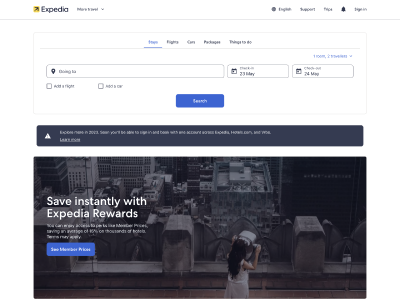About the client
Expedia Group, Inc. is an American OTA that owns and operates Expedia, Hotels.com, Vrbo, Travelocity, Hotwire.com, Orbitz, Ebookers, CheapTickets, CarRentals.com, Expedia Cruises, Wotif, and Trivago.
In Marketing We Trust has worked closely with Expedia since 2014, therefore we were embedded with their internal team for a decade. When senior leadership decided to stop all SEO vendor support, we quickly pivoted to become part of the transition and assist with one of their main initiatives while they recruited internally. During this transition, we helped the team build a solid base to become more efficient and less reliant on external support.
Challenge
Go from 60% to 100% Inhouse
The Expedia SEO team was outsourcing the equivalent of 40% of their workload to 10 different vendors.
The SEO team needed to change their way of operating. Instead of simply requesting vendors for additional marketing support and letting the vendors take care of the rest, the SEO team had to quantify the vendors’ support and translate it into a Full Time Employee request.
The SEO team also needed to map the skills required to understand what type of position they were recruiting for. This meant having to better manage their internal resources as this was partially outsourced to the vendors’ Account Managers.
Solution
Expanding Expedia’s Inhouse Capabilities
Quantifying Vendor Support
To quantify vendor support we introduced the “effort metric” to the Expedia SEO team, a standard metric used at In Marketing We Trust. “Effort” is used to scope every single project at In Marketing We Trust. Effort became a top-of-mind metric on every request or initiative for the Expedia team. This ensured the team started thinking like an inhouse team where efficiency was more important than before.
Skills Mapping
To help Expedia build a more robust inhouse team, we conducted an exercise that included the most common requests performed by vendors and mapped those against the skills required to perform them. This way, we were able to map “effort” and skills and give Expedia a much greater understanding of their recruitment needs.
Project Management
Once the right team was in place, the team had to do a massive migration process to consolidate their entire workload in one project management tool, Jira. This provided the granularity and structure the SEO team needed to work in collaboration.
Now every ticket created in Jira includes the effort against it. This enables all managers to manage workload in a more efficient way and understand exactly what is being asked from their team. This also allowed managers to join different work streams and shared initiatives. By understanding the effort behind the initiatives, managers could prioritise work that was dependent on other teams’ efforts.
Jira ticket structure was standardised and for large projects ticket creation was centralised so that all tickets were created with the same attributes. Dashboards were also created within Jira to provide progress overviews.
Agile Framework
To assist workload management and better prioritise work, we introduced the agile framework. The entire SEO team was trained in agile methodology. We began working in 2-week sprints, having backlog refinement and sprint planning meetings. This was a massive achievement for the team.
Team members who normally only communicated via Slack or Jira started to talk to each other, enabling them to empathise with different teams, providing better communication. Many of Expedia’s current processes were improved off the back of these meetings. Prioritisation is now based on cross-team support and not specific to one team.
Breaking Down Silos
Whenever you have a team of subject matter experts working remotely and spread across the world, especially when they have gone through many restructures, it is very easy to operate in silos. However, once the team has been consolidated and a shared strategy has been created, it is crucial to break down the silos so that the full benefits of having a solid team can be seen.
By facilitating cross-team meetings we were able to break down the silos and encourage conversations that didn’t occur on a regular basis. The team started to have more visibility of other team members’ problems and limitations and identify if they could support them, leveraging each person’s skills or knowledge. These meetings quickly became sessions where we would find solutions to problems that hadn’t been solved for a long time or where processes could be improved. Efficiencies and collaboration started materialising while communication became even more important. The team had underestimated the value of good communication and was now benefiting from it.
Results
Turning Expedia’s SEO Team into an Inhouse Powerhouse
We facilitated Expedia’s goal to go fully inhouse, removing 10 vendors from the SEO team. Managers now have more visibility of their team’s progress and workload with effort and prioritisation top-of-mind. They are now also able to take other team’s priorities into consideration. Workload management is now more accurate and there is better communication across the whole team.
With a centralised board that allows everyone to see progress and using the agile methodology, the pace of the entire Expedia SEO team was improved and standardised. This team is now a fully functional inhouse powerhouse.
In-house
from 10
Visibility on workload
Testimonials




